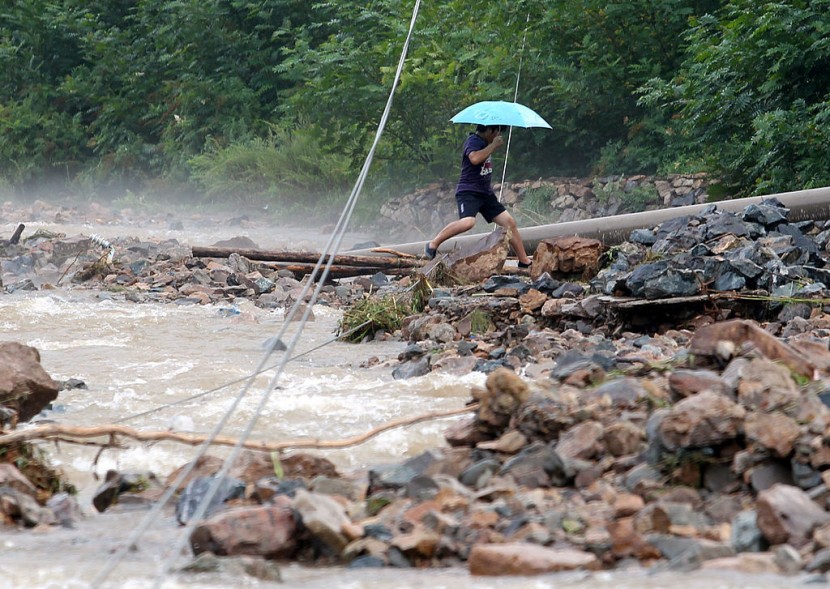
Heavy rains in North Korea resulted in the evacuation of thousands of people and destruction of over 1,100 houses. In the east of North Korea, where a food shortage is increasing, farms and roads have been swept away.
According to North Korea's official television, heavy rains in northeastern North Korea have damaged or flooded 1,170 homes, forcing 5,000 people to evacuate to safety. This week's rain in South Hamgyong Province flooded or swept away hundreds of acres of farmland and wrecked several bridges.
North Korea heavy rains are expected to continue in the following days
Houses submerged up to their red-brick roofs, a severed bridge over muddy water, and a swollen river were all shown in the footage. There were no casualties mentioned in the broadcast. It is expected that heavy rains will continue to fall in the north's eastern coastal districts during the following few days, NY Post reported.
Summer rains in North Korea frequently inflict severe damage to the country's agricultural and other sectors, owing to the impoverished country's deforestation, inadequate drainage, and crumbling infrastructure. The bad weather comes amid rising concerns over North Korea's food shortage, although foreign monitoring agencies have spotted no signs of widespread hunger or social upheaval.
According to official broadcaster KRT, it poured heavily in North and South Hamgyong provinces. Bridges and dikes were damaged, and homeowners' roofs were flooded. The National Hydro-Meteorological Administration's deputy director Ri Yong Nam stated there was more than 500 millimeters of rain in North Hamgyong from Sunday to Tuesday, August 3, but rainfall in South Hamgyong was above average. In a tweet, NK News' Senior Analytic Correspondent Colin Zwirko provided photos of flood-stricken regions.
We revealed extensive flood damage in North Korea using satellite imagery on Weds, now KCTV admits it with video of the broken bridges, destroyed homes and fields in the same exact areas
— Colin Zwirko (@ColinZwirko) August 6, 2021
These images are in Sinhung main town and surrounding area https://t.co/5O8rHYrfio pic.twitter.com/sl9wJxZzTx
According to Pyongyang's Korea Central Television, heavy rains have been inundating South Hamgyong Province, with rainfall ranging from 6 to 12 inches in the city of Hamhung and Sinhung and Ragwon counties. North Korea's meteorological agency's Ri Yong Nam, informed the official television that heavy rain is predicted along the country's eastern coast for the rest of August.
Per Republic World, the claimed destruction might have severe repercussions for North Korea's food production. According to a report released last year by the United Nations Office for the Coordination of Humanitarian Affairs, food shortages are caused by deterioration of essential agricultural infrastructure and repeated natural catastrophes.
Read Also: Bangladesh Lightning Strike Kills 17, Injures 14 People at a Wedding Party
Floods hit North Korea amid food crisis
The South Korean network JTBC said South Hamgyong Province and South Pyongan and Hwanghae provinces produce more than 60% of North Korea's rice. North Korea had stated that food production in 2020 would be down by more than 1 million tons compared to the previous year, citing natural catastrophes as the reason. Last year, Kim Jong Un visited typhoon-ravaged parts of the nation, including South Hamgyong Province.
North Korea's leader warned in June that the country's food situation was "tense," and that the harvests this year will determine much of the country's survival. State media have highlighted work on staking dikes and repairing bridges, ditches, and other infrastructure as part of measures to minimize flooding damage.
In a phone discussion on Friday, August 6, the South Korean Foreign Minister and the US Secretary of State addressed humanitarian supplies to North Korea, according to their offices. North Korea was recently compelled to disclose emergency military rice stocks as its food situation deteriorated.
A hot wave and drought have harmed the country's food supply, which has shut itself off from most outside imports and helped avoid a coronavirus outbreak and is also facing international sanctions. Although there have been no severe famine or civil unrest instances, analysts have predicted that the country's food supply will deteriorate further until the autumn harvest, as per Sky News.
Related Article: North Korea's Kim Jong Un Warns Young People to Face Jail or Execution If They Use Slang, Trendy Fashion from South
@YouTube
© 2026 HNGN, All rights reserved. Do not reproduce without permission.








